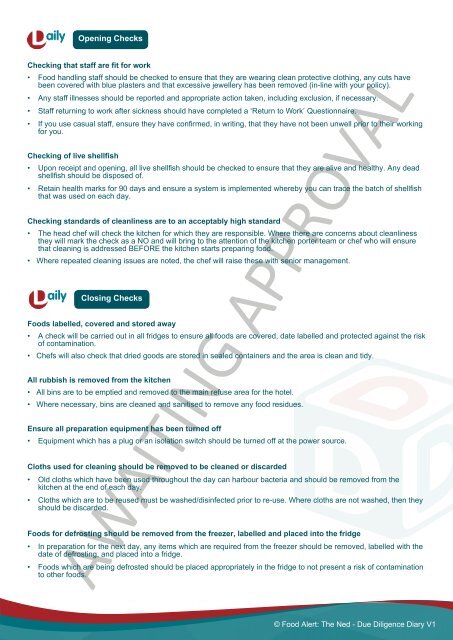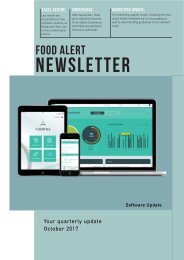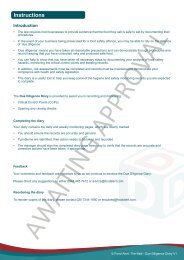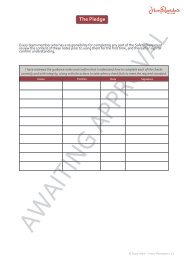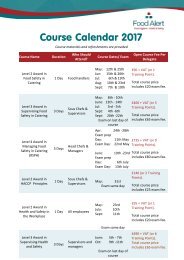The Ned Cecconi's diary v1
You also want an ePaper? Increase the reach of your titles
YUMPU automatically turns print PDFs into web optimized ePapers that Google loves.
ail<br />
Opening Checks<br />
Checking that staff are fit for work<br />
• Food handling staff should be checked to ensure that they are wearing clean protective clothing, any cuts have<br />
been covered with blue plasters and that excessive jewellery has been removed (in-line with your policy).<br />
• Any staff illnesses should be reported and appropriate action taken, including exclusion, if necessary.<br />
• Staff returning to work after sickness should have completed a ‘Return to Work’ Questionnaire.<br />
• If you use casual staff, ensure they have confirmed, in writing, that they have not been unwell prior to their working<br />
for you.<br />
Checking of live shellfish<br />
• Upon receipt and opening, all live shellfish should be checked to ensure that they are alive and healthy. Any dead<br />
shellfish should be disposed of.<br />
• Retain health marks for 90 days and ensure a system is implemented whereby you can trace the batch of shellfish<br />
that was used on each day.<br />
Checking standards of cleanliness are to an acceptably high standard<br />
• <strong>The</strong> head chef will check the kitchen for which they are responsible. Where there are concerns about cleanliness<br />
they will mark the check as a NO and will bring to the attention of the kitchen porter team or chef who will ensure<br />
that cleaning is addressed BEFORE the kitchen starts preparing food.<br />
• Where repeated cleaning issues are noted, the chef will raise these with senior management.<br />
ail<br />
Closing Checks<br />
Foods labelled, covered and stored away<br />
• A check will be carried out in all fridges to ensure all foods are covered, date labelled and protected against the risk<br />
of contamination.<br />
• Chefs will also check that dried goods are stored in sealed containers and the area is clean and tidy.<br />
All rubbish is removed from the kitchen<br />
• All bins are to be emptied and removed to the main refuse area for the hotel.<br />
• Where necessary, bins are cleaned and sanitised to remove any food residues.<br />
Ensure all preparation equipment has been turned off<br />
• Equipment which has a plug or an isolation switch should be turned off at the power source.<br />
Cloths used for cleaning should be removed to be cleaned or discarded<br />
• Old cloths which have been used throughout the day can harbour bacteria and should be removed from the<br />
kitchen at the end of each day.<br />
• Cloths which are to be reused must be washed/disinfected prior to re-use. Where cloths are not washed, then they<br />
should be discarded.<br />
Foods for defrosting should be removed from the freezer, labelled and placed into the fridge<br />
• In preparation for the next day, any items which are required from the freezer should be removed, labelled with the<br />
date of defrosting, and placed into a fridge.<br />
• Foods which are being defrosted should be placed appropriately in the fridge to not present a risk of contamination<br />
to other foods.<br />
© Food Alert: <strong>The</strong> <strong>Ned</strong> - Due Diligence Diary V1


